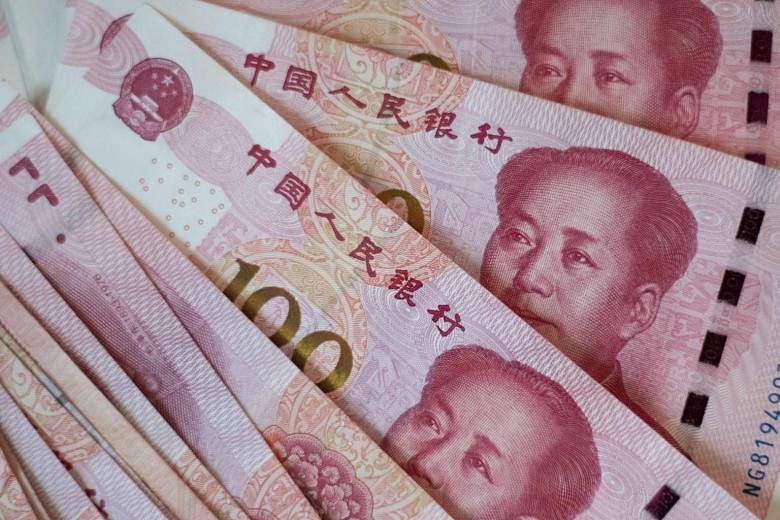BEIJING (CHINA DAILY/ASIA NEWS NETWORK) - Bond Connect has been successfully running for three years.
As a mutual market access arrangement that allows investors from the Chinese mainland and overseas to trade in each other's bond markets linked through the related mainland and Hong Kong financial institutions, Bond Connect plays an important role in attracting long-term investment to the Chinese market.
And given the Sino-US disputes, the yuan's internationalisation could offset the negative impact on financial enterprises' US dollar-denominated trade.
Thanks to China's rapid economic growth and the opening of its financial market, the yuan's international status is strengthening.
According to data from the International Monetary Fund's Composition of Official Foreign Exchange Reserves, released on June 30, total foreign exchange reserve in yuan in the first quarter was US$221.48 billion (S$303.52 billion)- after growing for five consecutive quarters.
The yuan's proportion in global foreign exchange reserves also hit a record high of 2.02 per cent.
Based on the Society for Worldwide Interbank Financial Telecommunications' latest report, in May, the proportion of the yuan in international payment settlement increased from 1.66 per cent to 1.79 per cent in April, the sixth highest worldwide.
And People's Bank of China data show that in 2019, cross-border trade settled in yuan increased to 6.04 trillion yuan (S$118.9 billion), up 18.2 per cent year-on-year.
But the use of the yuan as a payment settlement currency still lags far behind the US dollar.
Considering China's use of the dollar in trade and the proportion of dollar assets, any obstacle in the dollar-payment channel will have a huge negative impact on China's economy.
Thus China should expedite the yuan's internationalisation process, so as to make resource usage more efficient, promote economic development and maintain its financial system's stability.
Yet the yuan's internationalisation depends on the improvement of not only the yuan payment-settlement mechanism in foreign trade, but also the investment channel for yuan-denominated foreign assets.
In this context, Bond Connect sets a good example of promoting the yuan's internationalisation.
And since the Chinese economy grew 3.2 per cent year-on-year in the second quarter, mainly because China has largely contained the coronavirus outbreak at home, the country's bond market has a high interest margin compared with the dollar and euro markets.
By the end of June, Chinese bonds held by foreign investors through Bond Connect reached 2.5 trillion yuan, an increase of 320 billion yuan from December 2019.
This shows China's highly efficient and stable financial market is the main channel through which foreign investment flows into China and foreign investors acquire yuan-denominated assets.
Yuan bonds held by foreign investors through Bond Connect account for more than 90 per cent of the total yuan bonds held by them.
Building similar yuan investment channels could make yuan-denominated asset reserves even more attractive and thus propel the Chinese currency's internationalisation.
Besides, traditional payment and investment channels, and digital currency could also play important roles in the yuan's internationalisation.
The central banks of China and Sweden have decided to develop their own digital currencies, which have promising prospects in the global payment and investment fields. According to a survey of global central banks by the Bank of International Settlements in January, about 80 per cent of the central banks are researching how to launch their own digital currencies.
Besides making payment settlement easier, the digital currency issued by a central bank will have a demonstrative effect and enjoy merit of scale.
Since e-payment has become the norm in China, especially in cities, the time is right for the PBOC (People's Bank of China) to launch a digital currency.
And as the yuan is the world's sixth-largest settlement currency and part of the IMF's Special Drawing Rights basket, the launch of the PBOC's digital currency will accelerate the yuan's internationalisation process.
Offshore yuan centres, too, are facilitating the Chinese currency's internationalisation. Also, since the Chinese mainland's financial market system is different from that in the West, it is important to strengthen the Hong Kong offshore yuan centre so that the special administrative region can play an even bigger role as a bridge between the mainland and the rest of the world. After all, Hong Kong has played a very important role in making Bond Connect, Shanghai-Hong Kong Connect and Shenzhen-Hong Kong Connect a success.
The author is an economist with the Bank of China (Hong Kong). China Daily is a member of The Straits Times media partner Asia News Network, an alliance of 24 regional news media titles.

